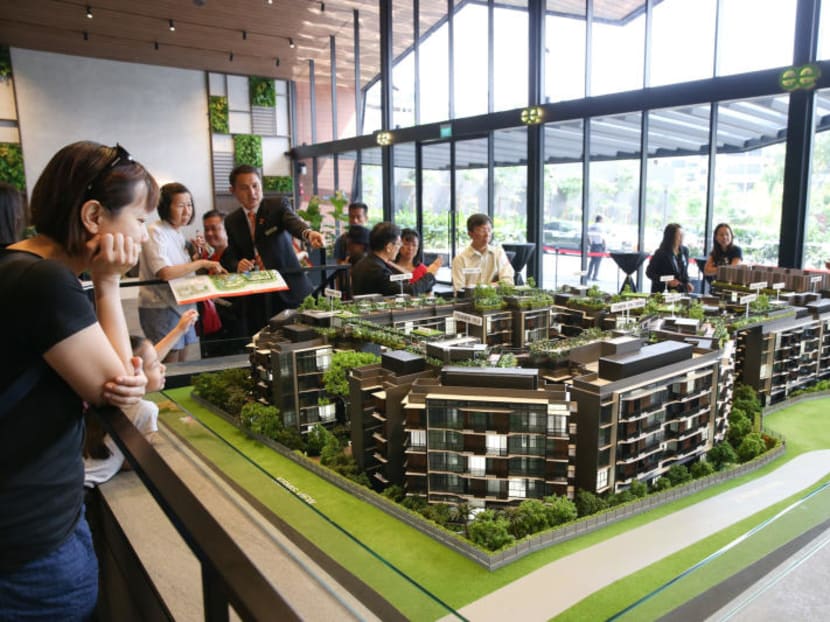Private homes may become cheaper, but buyers should hold their horses given weak economic climate: MAS
SINGAPORE — The number of unsold private homes in Singapore is increasing and with more launches coming up, the Monetary Authority of Singapore (MAS) has warned that a potential oversupply of unsold units could put pressure on the property market.

The Monetary Authority of Singapore said that the increase in unsold units could bring down the prices of private homes if the demand does not rise correspondingly.
SINGAPORE — The number of unsold private homes in Singapore is increasing and with more launches coming up, the Monetary Authority of Singapore (MAS) has warned that a potential oversupply of unsold units could put pressure on the property market.
In its financial stability review released on Thursday (Nov 28), the central bank said that the increase in unsold units could bring down the prices of private residential property if the demand does not rise correspondingly.
While this may be good news for homebuyers, MAS warned the public to be mindful of any big-ticket-item purchase as wage growth is expected to slow down this year and in 2020, given the uncertain economic outlook and a weaker labour market.
Based on the Urban Redevelopment Authority’s third-quarter data released on Oct 25, 32,000 unsold homes are in the pipeline.
Mr Chia Ngiang Hong, president of the Real Estate Developers’ Association of Singapore, had previously warned that an estimated 43,000 units would be launched for sale in the near future, including potential units that could come from Government Land Sales sites.
With only about 4,200 units sold in the first half of this year, he estimated that it would take four or five years for the market to absorb this excess supply of units.
IMPACT OF COOLING MEASURES
In July last year, in a bid to cool the property market, the Government raised the Additional Buyer’s Stamp Duty (ABSD) by 5 percentage points for individuals and 10 percentage points for entities, and tightened the loan-to-value limits that affect housing loans.
MAS said on Thursday that following the roll-out of the cooling measures, property price increases have slowed to a point where it is more in line with Singapore’s economic fundamentals.
Total transaction volumes have gone down by 32 per cent between the fourth quarter of 2018 and third quarter of this year, housing-loan growth has decreased and developers are more cautious when bidding for new land.
There has been only one successful en-bloc sale in the third quarter of last year since the cooling measures were put in place.
Despite the caution among developers on acquiring land, the number of unsold units would likely go up because developers have to build and launch new projects on sites that they acquired during the en-bloc frenzy between 2017 and 2018.
Developers in Singapore have to sell all units in their new projects within five years from the date they bought the land to avoid paying more ABSD.
A prolonged oversupply of unsold private homes may place downward pressure on prices in the medium term, MAS said in its review.
'EXERCISE PRUDENCE'
However, if prices get lower, the central bank's message to homebuyers is still one of caution: “Prospective buyers should be mindful of their ability to service long-term mortgage obligations and be cautious on taking new commitments to debt-financed property and other large purchases.”
This is because there is a possibility of an extended period of sluggish economic growth, it said.
Demand for labour could also drop, and wage increases are expected to slow down this year and the next, weakening the ability of households to service their debt.
MAS pointed out that while retrenchment numbers are still low, the number of workers on short work weeks has gone up. There are also fewer job vacancies than job seekers, a reflection of growing caution among companies in hiring, MAS said.
“Should labour market conditions continue to soften further, for instance, in response to an unexpected shock, this could undermine household income growth and consumer confidence,” MAS stated in the review.
FINANCIAL HEALTH OF SINGAPORE HOUSEHOLDS
Overall, Singapore’s households are in a healthy financial position as net wealth continues to grow, with liquid assets exceeding total debt obligations.
Total household debt has declined, helped by a slowing housing-loan growth that came about due to the property curbs, MAS said.
Housing loans account for 75 per cent of total household debt and thus are a key determinant of overall financial vulnerabilities, the central bank added.
WHAT ANALYSTS SAY
Mr Nicholas Mak, head of research and consultancy of property agency ERA, said that based on MAS’ review, one can infer that the authorities are not going to come up with new cooling measures.
Ms Tay Huey Ying, head of research and consultancy at property consultancy JLL, said that a supply glut may not come to pass as the number of unsold units has declined while demand has increased slightly from the second half of this year.
However, she acknowledged that things could take a turn for the worse if the economy weakens.
One way the Government could bring down the supply of unsold homes is to scale back some of the cooling measures for high-end private properties or to lower the ABSD for foreigners from 20 per cent now to 17 or 18 per cent, Mr Mak suggested.
This would increase demand among foreigners for prime developments, but not the mass-market properties that cater more to Singaporean buyers.











